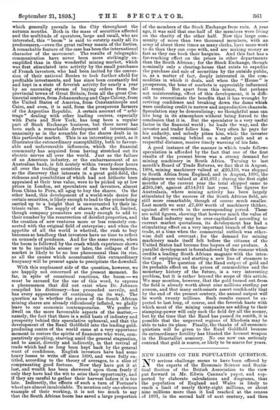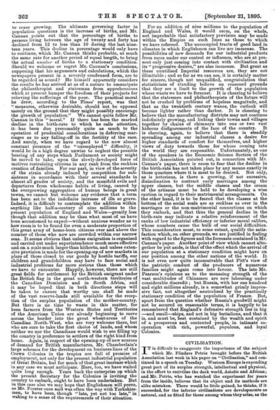NEW LIGHTS ON THE POPULATION QUESTION.
NO serious challenge seems to have been offered by the experts of the Economic Science and Statis- tical Section of the British Association to the view put forward in Mr. Edwin Cannan s paper, and sup- ported by elaborate calculations and diagrams, that the population of England and Wales is likely to reach a limit of nearly thirty-eight millions, or about nine millions more than it had reached at the census of 1891, in the second half of next century, and. then to cease growing. The ultimate governing factor in population questions is the increase of births, and Mr. Cannan points out that the percentage of births to persons living between the age of twenty and forty has declined from 12 to less than 10 during the last nine- teen years. This decline in percentage would only have to continue, which Mr. Cannan thinks probable, at much the same rate for another period of equal length, to bring the actual number of births to a stationary condition. Should we welcome or regret Mr. Cannan's conclusions, supposing that his arguments and calculations, which the newspapers present in a severely condensed form, are to be regarded as sound? He himself apparently considers the results he has arrived at as of a nature to emancipate the philanthropist and statesman from apprehensions which at present hamper the freedom of their projects for relieving the sufferings of the poor. The practical moral he drew, according to the Times' report, was that "measures, otherwise desirable, should not be opposed merely on the ground that they might possibly encourage the growth of population." We cannot quite follow Mr. Cannan in this "moral." If there has been the marked decline in the birth-rate to which he calls attention, it has been due presumably quite as much to the operation of prudential considerations in deferring mar- riages as to any falling-off in the fertility of the race. And surely, when we have regard to the now almost constant presence of the " unemployed " difficulty, it would be in a high degree unwise to neglect the possible bearing of any steps which Parliament or society might be moved to take, upon the slowly-developed force of motives restraining citizens in any rank from the reckless creation of families. For our part, in view of the severity of the strain already induced by competition for sub- sistence in accordance with their several standards in almost all grades of society, and the manifold evils and departures from wholesome habits of living, caused by the evergrowing aggregation of human beings in great towns, we cannot but welcome any evidence that a term has been set to the indefinite increase of ills so grave. Indeed, it is difficult to contemplate the addition within anything like half-a-century of nine millions to the present population of England and Wales—greatly less though that addition may be than what most of us have been accustomed to expect—without anxious wonder as to how room is to be found for even a moderate proportion of this great army of home-born citizens over and above the number of those who now are crowded within our narrow seas. It seems obvious that unless emigration is organised and carried out under superintendence much more effective and on a scale much larger than hitherto, and. unless exten- sive provision is made for the opening-up of new markets in place of those closed to our goods by hostile tariffs, our children and grandchildren may have to face social and industrial problems far more serious than those which we have to encounter. Happily, however, there are still great fields for settlement by the British emigrant under the British flag in the great north-western territories of the Canadian Dominion and in South Africa, and it may be hoped that in both directions steps will be taken to ensure that worthy use shall be made of the vast reserve-lands still available for the recep- tion of the surplus population of the mother-country. But there is no time to waste in this matter, for keen farmers from the Western States and Territories of the American -Union are already beginning to move across the border into the great wheat-areas of the Canadian North-West, who are very welcome there, but who are sure to take the first choice of lands, and whom neither we nor the Canadians would wish to see filling up the country in preference to settlers of the right kind from home. Again, in respect of the opening-up of new sources of demand for British manufactures, Mr. Chamberlain's large schemes for the development on business lines of the Crown Colonies in the tropics are full of promise of employment, not only for the present industrial population of Great Britain, but for much of that great increase which in any case we must anticipate. Here, too, we have waited quite long enough. Years back the enterprise on which the present Secretary for the Colonies is inviting the country to embark, ought to have been undertaken. Put in this case also we may hope that Englishmen will prove, as Mr. Forster once said was often the way with Yorkshire- men, to have been, though "late, yet not too late," in waking to a sense of the requirements of their situation. For an addition of nine millions to the population of England and Wales, it would seem, on the whole, not improbable that satisfactory provision may be made within the Empire on such lines as those to which we have referred. The unoccupied tracts of good land in climates in which Englishmen can live are immense. The possibilities of new demands for our industrial products from races under our control or influence, who are at pre- sent only just coming into contact with civilisation and its "progressive desires," are also immense. But great as these unutilised Imperial resources are, they are not illimitable ; and so far as we can see, it is certainly matter for sincere, though not unqualified, congratulation that statisticians of standing believe on reasoned grounds that they see a limit to the growth of the population whose wants we have to forecast. It is cheering to believe that the statesmen and philanthropists of the future will not be crushed by problems of hopeless magnitude, and that as the twentieth century wanes, the outlook will become lighter rather than darker. It is cheering to believe that the manufacturing districts may not continue indefinitely growing, and linking their towns and villages together by chains of chimneys into one or two vast hideous disfigurements of the face of the country. It is cheering, again, to believe that there is steadily spreading among our industrial classes a desire for higher standards of comfort for themselves, and higher views of duty towards those for whose coming into the world they are responsible. Unfortunately, as one of the speakers in the Economic Science Section of the British Association pointed out, in connection with Mr. Cannan's paper, there is room to fear that the decline in the birth-rate has not taken place by any means exactly in those quarters where it is most to be desired. Not only, as is notorious, is there a growing, if not excessive, disinclination to contract early marriages among the upper classes, but the middle classes and the cream of the artisans must be held to be developing a wise caution in regard to their matrimonial arrangements. On the other hand, it is to be feared that the classes at the bottom of the social scale are as reckless as ever in the marriages or the non-matrimonial connections on which they embark, and that thus the general decline in the birth-rate may indicate a relative reinforcement of the ranks of low industrial efficiency or inferior moral calibre, whose numbers cause the bulk of our social difficulties. This consideration must, to some extent, qualify the satis- faction which, on other grounds, we are justified in feeling with regard to the figures and the forecasts contained in Mr. Cannan's paper. Another point of view which cannot alto- gether be put aside, is that of the effect which the arrival of our population at a stationary condition might have on our position among the other nations of the world. It is not even now quite inconceivable that Pitt's view of the patriotic conduct of the producers of numerous families might again come into favour. The late Mr. Pearson's opinions as to the menacing strength of the vast multitudes of Chinamen are now labouring under considerable discredit ; but Russia, with her one hundred and eight millions already, is a somewhat grimly impres- sive fact, not altogether neutralised by the practically stationary condition of the population of France. But, apart from the question whether Russia's goodwill might not be secured on reasonable terms, it is happily to be remembered that England's defensive strength lies in big —and small—ships, and not in big battalions and that it is, and must be, best sustained by the wealth and spirit of a prosperous and contented people in intimate co- operation with rich, powerful, populous, and loyal Colonies.



































 Previous page
Previous page